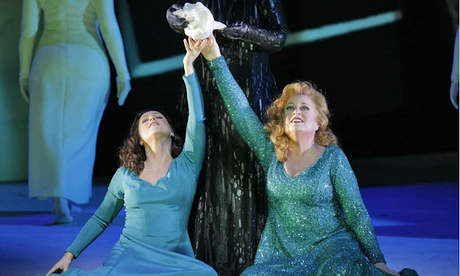by Paul J. Pelkonen

Aithra (Diana Damrau) and Helen of Troy (Deborah Voigt) pose with the Omsiscent Mussel in
the Metropolitan Opera's 2007 production of Strauss' Die Ägyptische Helena.
Photo by Ken Howard © 2007 The Metropolitan Opera.
Performances of Helena have been infrequent since its 1927 Dresden premiere. It is usually only seen when a soprano of considerable guts wants to add the demanding title role to her repertory. The other principal roles offer their own challenges. Helen's jealous, murderous husband Menelaus is a high tenor (like the Emperor in Die Frau ohne Schatten) who has a lot of music to sing very loudly in the upper part of the voice. The aquatic sorceress Aithra (she's married to Poseidon) has her own hefty vocal demands, demanding a soprano of some vocal heft with a clear upper register. Strauss calls for elaborate orchestral resources. And if all that isn't enough, the first act is set in Aithra's palace, which happens to be under water.
Despite its neglect, the artistic quality of this work is very high. Helena forms the third part of a loose "marriage" trilogy with the preceding Die Frau ohne Schatten and Intermezzo. In each of these operas, married couples face a series of stern tests, of fertility in Frau and of misplaced jealousy in Intermezzo. This opera is a bit more uncomfortable: examining what happened to Menelaus and his beautiful wife after she ran off to Troy with Prince Paris and started the nine-year conflict known as the Trojan War.
Hoffmansthal's libretto was inspired by the Euripides play Helen, which offers the idea that Helen never went to Troy at all. A daughter of the gods, she was spirited off to Egypt by the goddess Hera, and the Helen who was fought over was an eilodon or phantom. The opera's plot revolves around this idea, as the sorceress Aithra (who is the wife of Poseidon and lives in an underwater palace) attempts to convince Menelaus that his wife has in fact been asleep, like a fairy princess, for nine years at a palace in north-west Africa.
In the first act, Aithra learns from her Omniscient Mussel (a singing shellfish with a fetish for plot exposition) that Menelaus, sailing back from Troy with his wayward wife, is about to murder Helen. Aithra magically wrecks the ship and brings the couple to her palace. She welcomes Helen and distracts Menelaus with a specter of Paris. He chases the phantom outside and comes back believing he has killed both Helen and Paris. Aithra then convinces him that Helen is really alive and sleeping in a palace in the Atlas Mountains. She transports the couple (separately) to their rendezvous.
The first act offered Strauss rich opportunity for tone-painting, creating the roiling waves of the sea and the airy arches of Aithra's court from thunderous brass and minor-key runs in the woodwinds. he makes imaginative use of the contralto voice in his writing for the Omniscient Mussel, who must do its job without making the audience dissolve in laughter. Like Wagner's Die Walküre, the act is constructed as a series of duets and ends in an extraordinary trio for the three principles with Aithra's final words accompanied by the laughter of an offstage children's chorus.
The second act opens with one of Strauss' greatest arias for the soprano voice. "Zweiter brautnacht!" is an orgasmic explosion for the singer, pushing the soprano voice to its limit over a surging, blossoming series of rising orchestral chords. It is the centerpiece of the opera and of Helen's character as she sings of her hopes for renewed bliss. However, this peace and happiness is temporary: Strauss and Hofmannsthal are about to show how rocky the road to reconciliation is.
The aggressive Menelaus is not a sympathetic figure. In the second act, his jealousy gains new fuel as Helen is wooed by Altair, an African tribal chieftain and his handsome son Da-ud. Menelaus can't take it anymore and (offstage) murders Da-ud during a (offstage) hunting party. This sticky situation is finally resolved thanks to a magic potion (shades of Tristan) which Menelaus drinks, convinced Helen is trying to poison him. However, the potion brings back all of his memories of Helen. The opera ends with a final gift from Aithra: the last-minute return of Hermione, the daughter of the royal couple. Her arrival underlines the priorities and message of this opera: that in the face of true love, all may be forgiven.

